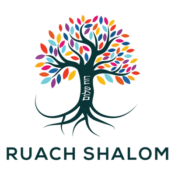I have always been fascinated by the question: “Where is my home?” “Where do I belong?” The need to belong is a basic need of every human being and the question of belonging is perhaps the most important question we can ask ourselves during our quest for the purpose of our lives.
My search for a “home” started very early in life. One day, I must have been about 8 years old, when I came home from playing with my best girlfriend down the street, I asked my mom: “Mommy, where do we actually belong?” The girlfriend’s home, where I spent a lot of time, was a strict Roman Catholic home. Going to church, to confession, to religious school, celebrating all Christian festivals. I was part of that family in a way and clearly felt there was something very meaningful that I did not find in my own home. That simple question sparked my mom’s interest and was the beginning of a big transition in my life and perhaps in the life of our entire family. My parents quickly realized that living in a small village, with very few Jews, could never give me the same feeling of belonging as Hebrew school would. At Hebrew school, I met kids my age with similar (post-Holocaust) backgrounds. Even though I didn’t realize it then, this turned out to be a crucial ingredient for that feeling of belonging. After Hebrew school on Sunday morning, I started going to Haboniem, the Zionist youth movement, in the afternoon. This was the beginning of a very active Jewish life that lasted till today.
The need to belong is a basic need and the desire to find a spiritual home often goes along with it. As I grow older, this desire has become stronger. More than ever, I feel the need for context, family, and community. To belong means to come home. It means to be yourself without being judged, to be heard and seen and have room to grow into the person you want to be, or you may say, are meant to be, to fulfill your purpose in life.
Within this definition a home can be anywhere in the world. It can be in a community, a family, a partnership. It can be inside in your heart. Feeling at home can be just a feeling and not a physical place and it can be in different places at the same time. Or to use a cliché: Home is where the heart is.
As a Jew, my spiritual home can be in a Jewish community or any community. Sometimes it takes a while to find that community. When I am lucky enough to have found which community fits me best, it will never be completely what I am looking for. There will always be a compromise and there may be times I don’t feel at home or even feel annoyed or upset with my community. In that case I need to ask myself: “How much am I willing to compromise?” and “How inclusive can I be without losing myself?” and “What can I contribute to make a change?”
Just a generation ago my parents and grandparents and great-grandparents did not ask themselves these questions. They simply belonged to a community that was passed on from one generation to the next. Or they chose to lead a secular life. To give an example, my parents were members of the orthodox Jewish community their whole lives. They were married and buried by orthodox rabbis. They were not believers or shulgoers in any way but were loyal to the choices their parents made before them. My children on the contrary, are not members of any community and identify as Jews just fine without it.
Within the Diaspora of our Jewish world, we as modern Jews have many options. We have a choice of many different communities, even virtual ones. The old paradigm of belonging to the same shul as our parents is no longer valid. We can identify with many different groups at the same time or identify as Jewish and not belong to any group. However, having so much freedom can be complicated because nothing is self-evident. We can make new choices every day and this can be quite confusing. The answer to the question:” Where do I belong?” can become quite challenging.
On my quest for my Jewish home, I meet people who understand and share my history, my beliefs, and my desires. With whom I can sing, pray, dance, philosophize and learn about our common and very rich heritage. With whom I can share my fear for the rise of antisemitism in the world. With whom I feel at ease and can be myself, so I have room to grow into the best version of me. I suspect that I will ultimately find that home inside myself.
I am curious to know what your Jewish home looks like.
